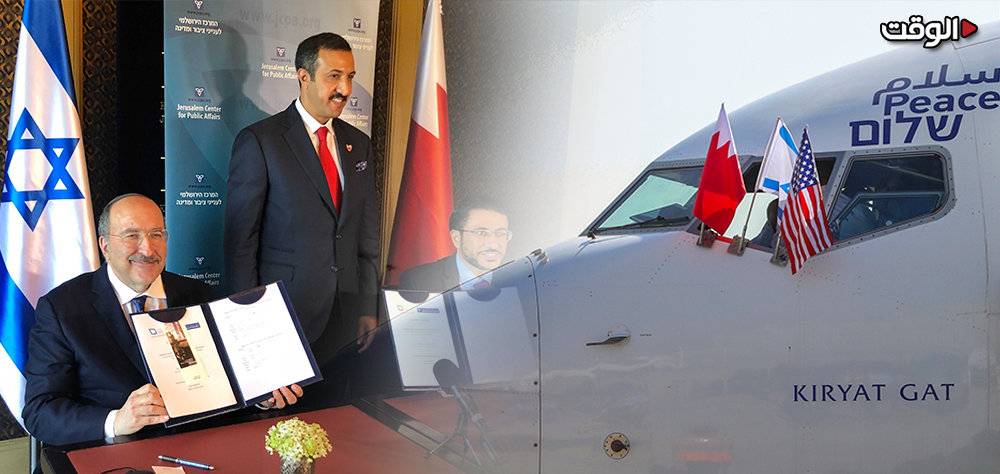Alwaght- Bahrain’s ruling family and Tel Aviv have expanded their bilateral cooperation since signing the normalization deal September last year. In May, Manama appointed its first ambassador in the occupied territories Khalid Yusef al-Jalahma.
Contrary to initial claims that the goal of normalization is stability and peace, the Al-Khalifa regime is openly pursuing anti-Iranian goals, disregarding the internal and regional consequences of developing relations with the Israelis.
On Sunday, the Bahraini Undersecretary for International Affairs Abdullah bin Ahmad Al-Khalifa and the Israeli Dore Gold signed a "research agreement" between the Bahrain Center for Strategic, International and Energy Studies (Derasat), which Al Khalifa heads, and the Jerusalem Center for Public Affairs, with final goal of confronting Iran in the "battle of narratives."
Money and espionage; the lucrative cyber cooperation market
In their justification and goals for normalization with the Israeli regime, the UAE and Bahrain leaders constantly said that they want to advance research and technology in collaboration with the Israelis. Tel Aviv is a major player in the field of cyber security worldwide, and Israeli companies have a large presence in cyber security services internationally.
The goal of the Persian Gulf Arab states is to ensure a high level of cyber security, which is considered very important to defend critical infrastructure and ensure the sustainable development of their national development programs. Despite major government service digitalization projects, smart cities, and plans to become the world's top technology hubs, these monarchies still lack the cyber security ecosystems needed to protect related digital infrastructure.
The need to sharpen the cyber security in the Persian Gulf through cooperation with Israeli companies was first raised in 2007, the year the UAE hired the Israeli company 4D Security Solutions to upgrade the defense system of its sensitive energy facilities and to create a "smart" supervision system across Abu Dhabi. According to media reports, the contract was worth $6 billion.
It is believed that that the supervision system, dubbed HawkEye, was completed in 2016. The system is constituted of a network of cameras, sensors, and artificial intelligence operating systems that control everything from traffic to public data.
Next years, Saudi Arabia allowed an Israeli consortium to join a venture launched to manage entries to Mecca for hajj. Although the partnership was not successful, the Bloomberg news agency reported that finally the Saudis adopted an electronic system similar to that proposed by the Israelis.
Riyadh also took assistance from Israeli security companies to meet its other cyber needs. In 2012, a major operation was launched against Saudi Aramco, destroying three-quarters of the government energy giant's computers, about 30,000 workstations, which at the time was described as history's largest commercial cyber attack. Years later, Israeli member of parliament Erel Margalit revealed that Israeli cyber security companies stepped in the case to help Aramco reverse the damage.
Now and a year after the normalization agreement, the Israelis are thinking of finding a wider path to the field of technological partnerships, especially in cyberspace, with the Arab countries, and through this, in addition to earning huge money, they are thinking of developing espionage capabilities in the region.
The cyber security market in the region is worth between $8 billion and $15 billion annually, and there are forecasts that the annual growth rate will be between 12 and 14 percent by 2025. In 2019, Israeli cyber technology companies made $6.5 billion in export revenue, as only the UAE's cyber security market is estimated around $490 million. Bahrain’s is expected to rise to $2.1 billion by 2024 from $1.4 in 2019 as Manama increases its investment in ICT.
But in the meantime, as mentioned, research cooperation with the Israelis will undoubtedly be part of a spy project that will target both the people of Bahrain and the regional countries. Recently, the Pegasus spyware scandal, which was used to spy on and assist dictatorial regimes to illegally monitor civil society activists and journalists such as the assassinated Jamal Khashoggi, demonstrated how the Israelis were stealing information and spying under cybersecurity partnerships with other countries, posing the biggest risk to information security and democracy.
Israeli Torjan Horse in Persian Gulf region
On May 7 Yossi Cohn, Mossad chief, traveled to Manama and met with Adel al-Fadhil, the chief of Bahraini security apparatus, and Ahmad Abdulaziz Al Khalifa, the head of Strategic Security Agency.
While it was already clear that Israeli access to the Persian Gulf will provide a window for Tel Aviv espionage and sabotage operations, this visit and now the so-called "research cooperation" deal with Bahrain discloses this reality.
The dictatorship of Al Khalifa, which suffers from illegitimacy, has resorted to the Israeli technological power to continue its repression of protesters, and Tel Aviv, which seeks to deal blows to regional states' interests disrupt democratic procedures, and create instability, is happy to seize such an opportunity.
As fissures emerge between Saudi Arabia and Bahrain over Riyadh’s reconciliation with Qatar, Al Khalifa seem to have grown dubious about receiving generous Saudi assistance to crack down on the pro-democracy and reforms in the country and thus seek a new partner. Last year, at a Manama meeting, Bahrain Foreign Minister Abdullatif bin Rashid Al Zayani said, "We and the Emirates have military cooperation with Israel and there is honest partnership among us."
So, the fearless expansion of cooperation with Tel Aviv will only increase the home discontentment and widen the gap between people and the government in Bahrain also provoke neighboring countries to take retaliatory actions as they see Israeli presence in their vicinity posing risks to their security. The consequences of such a situation will, indeed, preliminarily affect the short-sighted Bahraini rulers.



























